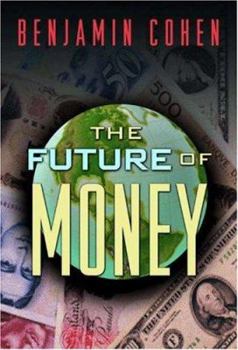The Future of Money
Select Format
Select Condition 
Book Overview
Is globalization leading us toward a world of fewer and fewer currencies and, consequently, simplified monetary management? Many specialists believe this is the case, as the territorial monopolies national governments have long claimed over money appears to be eroding. In The Future of Money , Benjamin Cohen argues that this view--which he calls the "Contraction Contention"--is wrong. Rigorously argued, written with extraordinary clarity, and thoroughly up-to-date, this book demonstrates that the global population of currencies is set to expand greatly, not contract, making monetary governance more difficult, not less. At the book's core is an innovative theoretical model for understanding the strategic preferences of states in monetary management. Should governments defend their traditional monetary sovereignty, or should they seek some kind of regional consolidation of currencies? The model offers two broad advances. First, whereas most scholarly work evaluates strategic options individually or in comparison to just one other alternative, this model emphasizes the three-dimensional nature of the decisions involved. Second, the model emphasizes degrees of currency regionalization as a central determinant of state preferences. Cohen also systematically explores the role of the private sector as an alternative source of money. The book concludes with two key policy proposals. First, fiscal policy should be resurrected as a tool of macroeconomic management, to offset the present-day erosion in the effectiveness of monetary policy. Second, the International Monetary Fund should more actively help coordinate the decentralized strategic decision-making of governments. The future of money will be perilous. But, by mapping out the alternative policies countries can follow, The Future of Money shows it need not be chaotic.
Format:Hardcover
Language:English
ISBN:0691116652
ISBN13:9780691116655
Release Date:December 2003
Publisher:Princeton University Press
Length:294 Pages
Weight:1.40 lbs.
Dimensions:1.2" x 6.0" x 9.3"
Customer Reviews
3 ratings
The Future of Money
Published by Thriftbooks.com User , 16 years ago
Great book. Well written and easy to read even for someone who is not familiar with financial language.
A decent introduction to what's going on with the world's money
Published by Thriftbooks.com User , 18 years ago
I'm not an economist so I might be rating this book higher or lower than someone who knows this stuff, but for the lay person it was a pretty good read. One thing to note up front is that this is more of an academic book than the normal pop-econ books that most of us are used to seeing. The paragraphs are heavily cited and the reader is assumed to know at least a little about modern international finance (I had to spend some time on wikipedia more than a few times). Cohen spends most of the book laying out the arguments to why most economists think that the number of currencies in the world is going to contract (down to only the dollar, euro, and yen), with hints of his upcoming argument. Then in the last chapter he lays out his argument which claims that the number of currencies is going to rise in the near future. I learned quite a bit about international monetary policies from most of the book and became pretty convinced of his arguments that we won't ever have a world with just three currencies, but I found his argument for many more currencies pretty weak. It seemed like he just plopped that last chapter on quickly feeling the need to talk about the internet. And he used the word 'flooz' way too much to be respected. To summerize, I found the book worth the time spent to read it (which is a lot better than most pop-econ books) and although I think his ending arguments were weak I don't necessarily think that he's wrong.
A Good Read!
Published by Thriftbooks.com User , 21 years ago
This book is a thoughtful, amply documented reflection on the future of currency. The dollar, euro and yen dominate the global monetary order, with the dollar now unrivaled at the top and unlikely to be threatened in the future. The countries that issue lesser currencies face a trade-off between monetary sovereignty and international acceptability (with all its economic advantages). Some economists say these lesser currencies should simply dollarize, that is, sacrifice their monetary sovereignty on the altar of international economic efficiency by adopting a stronger currency as their own. Author Benjamin J. Cohen argues that these countries are likely to reject dollarization because the emotional and political advantages of issuing one's own currency are simply too strong. He suggests various alternate mechanisms that allow countries to maintain some monetary independence and authority while gaining the advantages of a fully liquid, widely used currency. Non-specialists may find his extensive discussions a bit dry or sometimes tedious, but we applaud the author's ability to explore monetary economics in admirably lucid detail.






